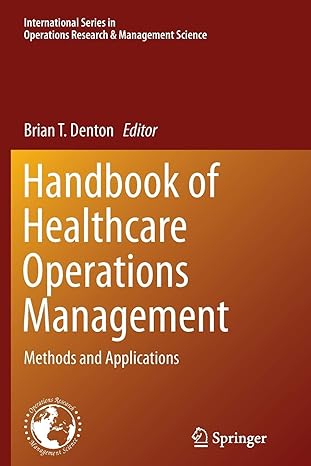Go back


Handbook Of Healthcare Operations Management Methods And Applications(2013th Edition)
Authors:
Brian T. Denton

Cover Type:Hardcover
Condition:Used
In Stock
Include with your book
Free shipping: April 04, 2024Popular items with books
Access to 3 Million+ solutions
Free ✝
Ask 10 Questions from expert
200,000+ Expert answers
✝ 7 days-trial
Total Price:
$0
List Price: $195.17
Savings: $195.17(100%)
Book details
ISBN: 1489995501, 978-1489995506
Book publisher: Springer
Get your hands on the best-selling book Handbook Of Healthcare Operations Management Methods And Applications 2013th Edition for free. Feed your curiosity and let your imagination soar with the best stories coming out to you without hefty price tags. Browse SolutionInn to discover a treasure trove of fiction and non-fiction books where every page leads the reader to an undiscovered world. Start your literary adventure right away and also enjoy free shipping of these complimentary books to your door.
Handbook Of Healthcare Operations Management Methods And Applications 2013th Edition Summary: From the Preface:Collectively, the chapters in this book address application domains including inpatient and outpatient services, public health networks, supply chain management, and resource constrained settings in developing countries. Many of the chapters provide specific examples or case studies illustrating the applications of operations research methods across the globe, including Africa, Australia, Belgium, Canada, the United Kingdom, and the United States.Chapters 1-4 review operations research methods that are most commonly applied to health care operations management including: queuing, simulation, and mathematical programming. Chapters 5-7 address challenges related to inpatient services in hospitals such as surgery, intensive care units, and hospital wards. Chapters 8-10 cover outpatient services, the fastest growing part of many health systems, and describe operations research models for primary and specialty care services, and how to plan for patient no-shows. Chapters 12 – 16 cover topics related to the broader integration of health services in the context of public health, including optimizing the location of emergency vehicles, planning for mass vaccination events, and the coordination among different parts of a health system. Chapters 17-18 address supply chain management within hospitals, with a focus on pharmaceutical supply management, and the challenges of managing inventory for nursing units. Finally, Chapters 19-20 provide examples of important and emerging research in the realm of humanitarian logistics.
Customers also bought these books
Frequently Bought Together
Top Reviews for Books
Request s7s5fq5
( 5 )
"Delivery was considerably fast, and the book I received was in a good condition."










